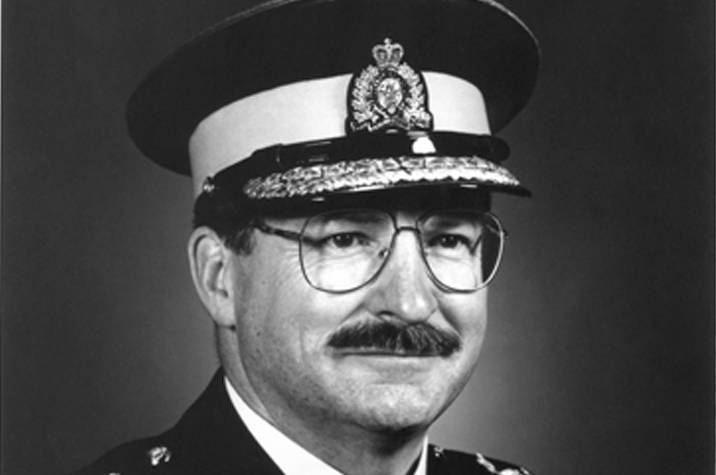Retired RCMP Commissioner Norman Inkster reflects on what it means to be part of the community you serve (Q-and-A)
By Meagan Massad

Commissioner Norman Inkster was known for “changing the face" of the organization by campaigning to make the RCMP a career option for all Canadians no matter their race, gender, or ethnic background.
Image by RCMP
May 5, 2024
Content
Norman David Inkster served as the 18th Commissioner of the RCMP from 1987 to 1994. Over his nearly 40-year career, Inkster was known for "changing the face" of the organization by campaigning to make the RCMP a career option for all Canadians no matter their race, gender, or ethnic background. In this first installment of our former Commissioners series, Gazette writer Meagan Massad sat down with Inkster to chat about his memories of working in small communities.
- What inspired you to become a Mountie?
- I was five years old and in school and watching a movie about the RCMP Musical Ride. Although the horses looked rather intimidating, it was the sight of the Mounties in their red serge that caught my attention. It was a very romantic first impression of the RCMP, which has ultimately lasted all my life.
- When did you start working for the RCMP and how long was your tenure?
- I was sworn in on April 15, 1957, and I served until June of 1994 — so 37 years. In 1987, I was appointed Commissioner by Prime Minister Mulroney, and thought I might stay in the job for five years but I was in the position for a total of seven. After Parliament switched from Conservative to Liberal, I was asked to stay on another couple years to help with the transition.
- What memory stands out for you during your career?
-
When I was working in Cambridge Bay in Nunavut with the Governor General, we were there to celebrate the traverse of a ship called the RCMPV St. Roch, and it was also my birthday.
While I was there, I'd heard there were some wood carvings being made down by the local gymnasium so my colleagues and I went to visit. There were three young boys who were sitting outside eating ice cream cones. One of the young boys looked at me very seriously and said, "Are you working? Because someone stole my bicycle and I'd like to get it back." I figured that in a small town of 300 people, we could probably help track down his bike. So, I enlisted the support of the local detachment to find it. Sure enough, they were able to track it down and return it to the young man.
- What did you enjoy most about working for the RCMP?
- The thing that stands out to me most is the RCMP's sense of community. It's the team aspect of the job that attracts people to it. You feel like you can count on one another. For example, when I was in New Brunswick, and my family was in Saskatchewan, my mother passed away suddenly. My father was mentally unwell and had been drinking in a hotel room at the time of my mother's passing. I was worried about the wellbeing of my father, but I wasn't sure what to do since I was so far away. So, I picked up the phone and called the RCMP detachment in Broadview, Saskatchewan. I described the situation to a young member. The member assured me that he would help my family. Sure enough, he called me a day later and said he'd gone to my home to check in on my brothers, as my mother had passed away at home. He also went to the hotel where my father had been staying and ensured his safety and that he was taken care of. It was very comforting.
- Did you ever meet the officer who helped you?
- I did. Years later, after I became Commissioner. He came and introduced himself as the person who had taken care of my father. Sadly, with the passing of time, I don't have his name at my fingertips, but I will always remember this gesture of kindness.
- Is it true you had a motto?
- Yes, at the time I was Commissioner, the focus was on community-based policing. My motto came from Sir Robert Peel, who said: "The community is part of the police and the police are part of the community." It's important in a country like Canada, where a lot of communities are more rural; people need to help out where and when they can. There is no magic to police work in my view; when police are embedded in their neighborhoods, they can better understand their community.
- Do you have any final thoughts about your time in the RCMP?
-
The RCMP will always be integral to the communities in which they serve. It's a fulfilling career when you're able to see the difference you can make in those smaller communities. You very much become a part of the community.
When I was stationed in Three Hills, Alberta, as a constable, the town priest came to my office one day and said "I'd like you to direct the town's Christmas play." I hadn't the slightest idea how to direct a town play, but the working assumption was that I knew all about that because I was a Mountie. I ended up agreeing to direct the play. I'm not sure if it was very good but people stood up and clapped at the end so that counts for something. It just goes to show how much confidence that little community had in their Mounties. Maybe things are a bit different nowadays, but I think this job can be very unique and fulfilling if you allow it to be.